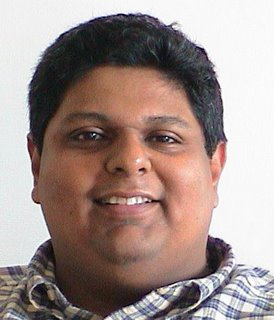
Raj currently leads the Diversity function for Monsanto globally. As a leader within the Talent Management group, he partners with Staffing and OD leaders to provide integrated solutions across various facets of people issues to the company.
Prior to this role, Raj has held both generalist and specialist roles in India, Singapore and the US.
Raj has a total of 12 years experience in industry after completing his Masters in HR from XLRI, India. He started his career with Wipro, an Indian company working in the consumer products area in both manufacturing and sales HR.
Raj has co-presented at the Annual convention of the ASTD (American Society of Training & Development) in 1998. He was part of a team that won an award from the OD Institute for the work done in building the Monsanto India Organization. He has also co-published a paper in the Journal for Applied Behavioural Sciences in March 2005.
He has a passion for travel, cooking, reading, music, movies. He enjoys cricket, baseball, football (both soccer and American football) and pool. He is married.
"Where do you see the future of the work and what skills should young professionals build to be ready for further challenges?"
In many ways, the future of work is here . A few months ago I was in a seminar, when someone started talking about what's the latest in the technology industry. Forget the technology ideas, here's some things which are already happening on the people front. People working on virtual teams meet twice a year for a week at a time in some part of the world. That is the only face to face contact they have - the rest of the time, it's all online.
Know someone who works in customer service, and they go to work in their living room if they care to. Customers call the 800 number, calls are routed to these individuals on their cell fones - so you might be in a coffee shop for all that matters - as long as you have the computers up and running to support that call. Change in work, is going to revolve around the role of technology, how much work can be done in a fixed time frame, etc - but once all that is in place, something still needs to happen. People need to make decisions, act and then manage the consequences of their actions.So, while work continues to change in terms of how it is performed, it also remains the same in terms of what needs to get done - results being delivered. In essence that raises two questions on the skills as well - what is new and what stays the same. So what's new? - Comfort with everchanging technology and rapidly changing situations? But that's already here.
To me the most critical skill required to succeed and continue to succeed is the ability to work through and with people of different kinds.Getting out of institute's with or without prior work experience, the premium is always on the technical knowledge, skills - however, those can be picked up later from books, training courses etc. What needs attention at an early stage is the focus to develop the ability to work with people from different countries, age groups, work ethics, value systems, sexual orientations - which requires a high level of emotional intelligence. An eg. Take the HR function. The world has moved to a situation where the employee has real choices - so suddenly, it's no longer acceptable to pay lip service to practices such as job sharing, telecommuting. It's taken a while for that mindset to change, but perhaps in very few places. So, faced with a situation where these 'strange' requests become issues and top performers leave - creates never before faced situations. Working with a belief, that a good day's work is 12 hours in the office or whatever is going to make that HR manager redundant.
Previous thought leaders in the series: Abhijit Bhaduri, Shabbir Merchant
No comments:
Post a Comment